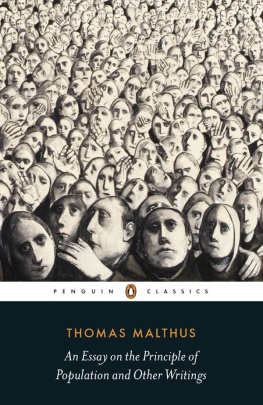Malthus Thomas-Robert - Nature and Progress of Rent
Here you can read online Malthus Thomas-Robert - Nature and Progress of Rent full text of the book (entire story) in english for free. Download pdf and epub, get meaning, cover and reviews about this ebook. genre: Science. Description of the work, (preface) as well as reviews are available. Best literature library LitArk.com created for fans of good reading and offers a wide selection of genres:
Romance novel
Science fiction
Adventure
Detective
Science
History
Home and family
Prose
Art
Politics
Computer
Non-fiction
Religion
Business
Children
Humor
Choose a favorite category and find really read worthwhile books. Enjoy immersion in the world of imagination, feel the emotions of the characters or learn something new for yourself, make an fascinating discovery.
- Book:Nature and Progress of Rent
- Author:
- Genre:
- Rating:5 / 5
- Favourites:Add to favourites
- Your mark:
- 100
- 1
- 2
- 3
- 4
- 5
Nature and Progress of Rent: summary, description and annotation
We offer to read an annotation, description, summary or preface (depends on what the author of the book "Nature and Progress of Rent" wrote himself). If you haven't found the necessary information about the book — write in the comments, we will try to find it.
Nature and Progress of Rent — read online for free the complete book (whole text) full work
Below is the text of the book, divided by pages. System saving the place of the last page read, allows you to conveniently read the book "Nature and Progress of Rent" online for free, without having to search again every time where you left off. Put a bookmark, and you can go to the page where you finished reading at any time.
Font size:
Interval:
Bookmark:
The Project Gutenberg EBook of Nature and Progress of Rent, by Thomas Malthus
This eBook is for the use of anyone anywhere at no cost and with
almost no restrictions whatsoever. You may copy it, give it away or
re-use it under the terms of the Project Gutenberg License included
with this eBook or online at www.gutenberg.org
Title: Nature and Progress of Rent
Author: Thomas Malthus
Release Date: January 12, 2010 [EBook #4336]
Language: English
*** START OF THIS PROJECT GUTENBERG EBOOK NATURE AND PROGRESS OF RENT ***
Produced by Charles Aldarondo Aldarondo, and David Widger
In the East India College, Hertfordshire
Advertisement RENT &c. FOOTNOTES |
The following tract contains the substance of some notes on rent, which, with others on different subjects relating to political economy, I have collected in the course of my professional duties at the East India College. It has been my intention, at some time or other, to put them in a form for publication; and the very near connection of the subject of the present inquiry, with the topics immediately under discussion, has induced me to hasten its appearance at the present moment. It is the duty of those who have any means of contributing to the public stock of knowledge, not only to do so, but to do it at the time when it is most likely to be useful. If the nature of the disquisition should appear to the reader hardly to suit the form of a pamphlet, my apology must be, that it was not originally intended for so ephemeral a shape.
The rent of land is a portion of the national revenue, which has always been considered as of very high importance.
According to Adam Smith, it is one of the three original sources of wealth, on which the three great divisions of society are supported.
By the Economists it is so pre-eminently distinguished, that it is considered as exclusively entitled to the name of riches, and the sole fund which is capable of supporting the taxes of the state, and on which they ultimately fall.
And it has, perhaps, a particular claim to our attention at the present moment, on account of the discussions which are going on respecting the corn laws, and the effects of rent on the price of raw produce, and the progress of agricultural improvement.
The rent of land may be defined to be that portion of the value of the whole produce which remains to the owner of the land, after all the outgoings belonging to its cultivation, of whatever kind, have been paid, including the profits of the capital employed, estimated according to the usual and ordinary rate of the profits of agricultural stock at the time being.
It sometimes happens, that from accidental and temporary circumstances, the farmer pays more, or less, than this; but this is the point towards which the actual rents paid are constantly gravitating, and which is therefore always referred to when the term is used in a general sense.
The immediate cause of rent is obviously the excess of price above the cost of production at which raw produce sells in the market.
The first object therefore which presents itself for inquiry, is the cause or causes of the high price of raw produce.
After very careful and repeated revisions of the subject, I do not find myself able to agree entirely in the view taken of it, either by Adam Smith, or the Economists; and still less, by some more modern writers.
Almost all these writers appear to me to consider rent as too nearly resembling in its nature, and the laws by which it is governed, the excess of price above the cost of production, which is the characteristic of a monopoly.
Adam Smith, though in some parts of the eleventh chapter of his first book he contemplates rent quite in its true light, and has interspersed through his work more just observations on the subject than any other writer, has not explained the most essential cause of the high price of raw produce with sufficient distinctness, though he often touches on it; and by applying occasionally the term monopoly to the rent of land, without stopping to mark its more radical peculiarities, he leaves the reader without a definite impression of the real difference between the cause of the high price of the necessaries of life, and of monopolized commodities.
Some of the views which the Economists have taken of the nature of rent appear to me, in like manner, to be quite just; but they have mixed them with so much error, and have drawn such preposterous and contradictory conclusions from them, that what is true in their doctrines, has been obscured and lost in the mass of superincumbent error, and has in consequence produced little effect. Their great practical conclusion, namely, the propriety of taxing exclusively the net rents of the landlords, evidently depends upon their considering these rents as completely disposable, like that excess of price above the cost of production which distinguishes a common monopoly.
M. Say, in his valuable treatise on political economy, in which he has explained with great clearness many points which have not been sufficiently developed by Adam Smith, has not treated the subject of rent in a manner entirely satisfactory. In speaking of the different natural agents which, as well as the land, co-operate with the labours of man, he observes, 'Heureusement personne n'a pu dire le vent et le soleil m'appartiennent, et le service qu'ils rendent doit m'etre paye.' And, though he acknowledges that, for obvious reasons, property in land is necessary, yet he evidently considers rent as almost exclusively owing to such appropriation, and to external demand.
In the excellent work of M. de Sismondi, De la richesse commerciale, he says in a note on the subject of rent, 'Cette partie de la rente fonciere est celle que les Economistes ont decoree du nom du produit net comme etant le seul fruit du travail qui aj outat quelquechose a la richesse nationale. On pourrait au contraire soutenir contre eux, que c'est la seule partie du produit du travail, dont la valeur soit purement nominale, et n'ait rien de reelle: c'est en effet le resultat de l'augmentation de prix qu'obtient un vendeur en vertu de son privilege, sans que la chose vendue en vaille reellement d'avantage.' The prevailing opinions among the more modern writers in our own country, have appeared to me to incline towards a similar view of the subject; and, not to multiply citations, I shall only add, that in a very respectable edition of the Wealth of nations, lately published by Mr Buchanan, of Edinburgh, the idea of monopoly is pushed still further. And while former writers, though they considered rent as governed by the laws of monopoly, were still of opinion that this monopoly in the case of land was necessary and useful, Mr Buchanan sometimes speaks of it even as prejudicial, and as depriving the consumer of what it gives to the landlord.
In treating of productive and unproductive labour in the last volume, he observes,
That there are some circumstances connected with rent, which have an affinity to a natural monopoly, will be readily allowed. The extent of the earth itself is limited, and cannot be enlarged by human demand. And the inequality of soils occasions, even at an early period of society a comparative scarcity of the best lands; and so far is undoubtedly one of the causes of rent properly so called. On this account, perhaps, the term partial monopoly might be fairly applicable. But the scarcity of land, thus implied, is by no means alone sufficient to produce the effects observed. And a more accurate investigation of the subject will show us how essentially different the high price of raw produce is, both in its nature and origin, and the laws by which it is governed, from the high price of a common monopoly.
Font size:
Interval:
Bookmark:
Similar books «Nature and Progress of Rent»
Look at similar books to Nature and Progress of Rent. We have selected literature similar in name and meaning in the hope of providing readers with more options to find new, interesting, not yet read works.
Discussion, reviews of the book Nature and Progress of Rent and just readers' own opinions. Leave your comments, write what you think about the work, its meaning or the main characters. Specify what exactly you liked and what you didn't like, and why you think so.







